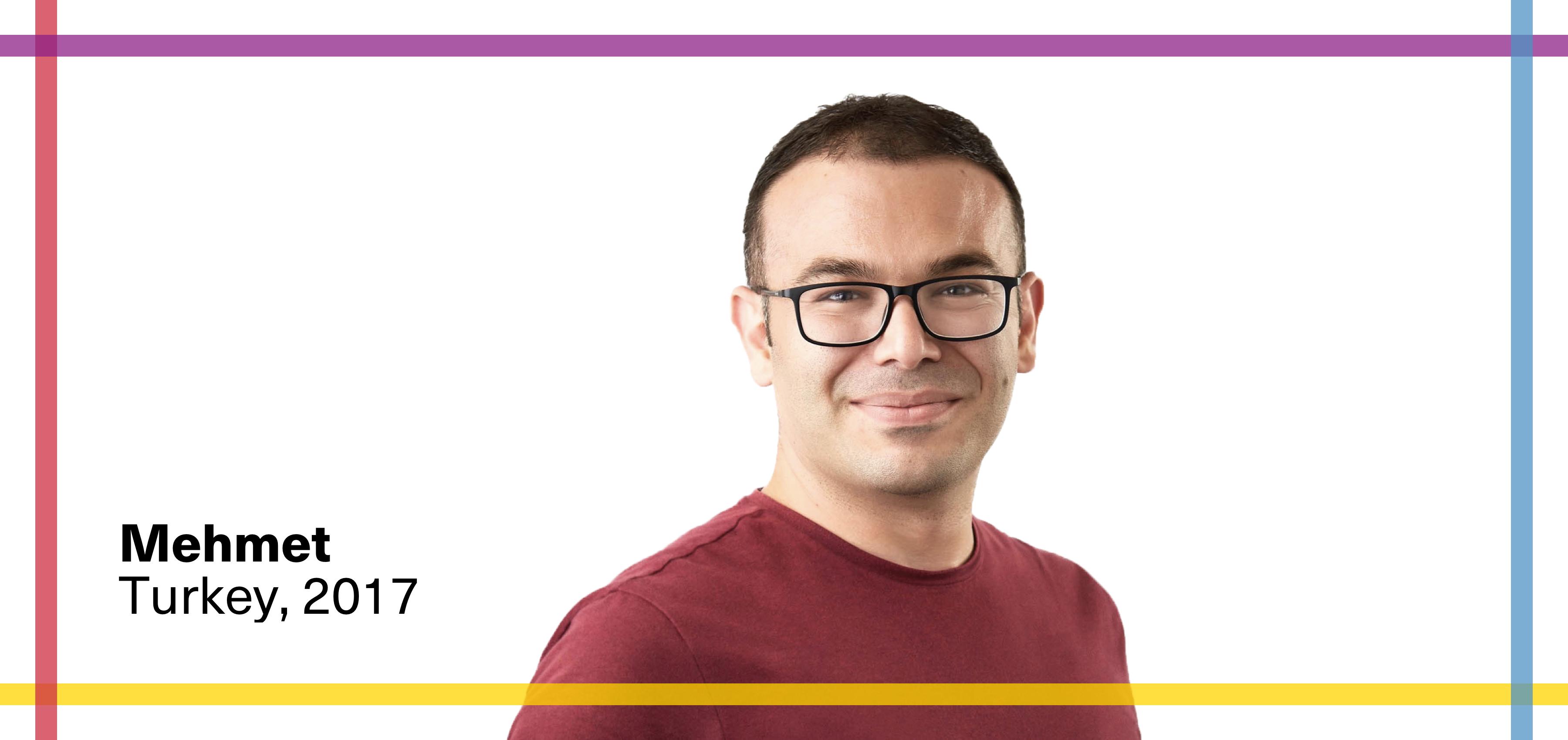From an interview with Mehmet Akgul.
Mehmet Akgul completed his Bachelor of Science and Master of Science degrees in Istanbul, Turkey. He remembers taking a twelve hour bus ride from the city to visit his parents in his hometown of Konya. In 2017, Mehmet took a twelve hour flight from Turkey to Canada to pursue his PhD, at McMaster University in Hamilton. He left his career and family behind to follow his dreams and explore new opportunities here. Like many newcomers, Mehmet faced challenges adapting to a new culture and way of doing things. He shares his story of working hard and finding support through his university community, making friends with fellow international students and Canadians, and how people here helped him feel welcome and helped make his newcomer journey more joyful.
Maybe coming to Canada was self-fulfillment, I’m not sure. But there were things that I really wanted to do, and I had been thinking about it for a long time. After graduating from university in Turkey, I worked as a consultant at an IT company for several years before moving to the IT side of the banking industry as a software developer and enterprise architect.
In 2013, I received a scholarship to study in the U.K. I did my Master of Science (M.Sc.), Finance and Information Technology at Warwick Business School – University of Warwick. It was a good opportunity. I really liked the town and I thought it would be great to stay there, however I was only legally allowed to stay in the U.K. for a few months after completing my degree. So I returned to my job at the bank in Turkey, and worked there for three more years.
Just before deciding to come to Canada, a good job opportunity came up in my home city, and I was torn because my family was there. They said, “You have a job. You have a life. Your family is here.” Of course, I understood their concerns, but there was something inside me: I wanted to go abroad and explore new opportunities. I decided I would go to Canada to get my PhD, and then work and continue my life there. I thought, “If not at this time, then when, and would this opportunity come again?”
Coming to Canada: finding a place to stay and belong
Before leaving home, I looked up PhD professors and student profiles at McMaster University where I would soon be a PhD candidate in Information Systems at DeGroote School of Business. I saw that there was a fellow student from Turkey – I could tell by just looking at his name. I messaged him and explained that I had been accepted to this program and asked if we could have a short video meeting. He agreed and gave me suggestions about housing and so on. (It turns out he graduated from the same university that I did my Bachelors degree).
Thanks to his advice and guidance, I found a place to live that allowed me to pay week to week, before I had even set foot in Canada. I wanted temporary accommodation for flexibility – to give me time to understand how the university worked and which part of the city I would like to live in later on.
I arrived in Canada on a Sunday evening, and the next morning I went to the university because there was an event. It just started so fast. Within one week the courses started and the time passed so quickly. I was still jet-lagged, so I was going to bed around 5 or 6 each evening.
Before coming here my idea was to complete my degree as soon as possible and then find a job. I concentrated on my studies both for the first term and the second term. It’s challenging when you come to a new place: I didn’t know anyone, I just interacted with the other PhD students – which was great, but you want to have more of a life, right?
Making friends is an important part of your new life in Canada
I believe there is a big difference between an undergraduate and PhD student’s life. For the undergrads, there are so many classes, and generally, they are crowded ones. So it might be easier to meet many people and make friends.
On the other hand, for a PhD, the number of admitted students is very low. In my cohort, for example (Information Systems), there were five students: three of them were married, and one of them had already started living with a friend. So, I was the only one who didn’t know anybody in the whole of Canada! PhD events such as dinners and welcome parties each year enabled students to share their experiences within the university. These were also nice events for socialization.
Some of the other PhD students were in different fields but we became good friends. Friends coming from different countries can provide a support circle, especially if you are facing difficult times. My first few friends introduced me to more people and helped me grow my social circle. I went sightseeing in Niagara Falls and in Toronto with these new friends. They invited me to their homes in Hamilton, Burlington and Mississauga and introduced me to their family members. My professor also invited me to his home a couple of times.
My supervisor has been very supportive as well, which was particularly important during this COVID situation, both for my studies and also issues outside of studies as well. It’s very important to me to have this support network that I can turn to for advice or when I need to discuss issues or problems I encounter.
In the second year, I started to take swimming and dance classes. Dance classes were especially great to know students from other departments. During this year, I also started to work part-time in Toronto, and was able to make new friends through work too.
I also have Canadian friends and I’ve learned a lot from them. For example, they have helped me with language and culture issues. Since English is not my first language, from time to time, I said things (which are perfectly fine when I think in my own language) but can mean a different thing for the other party. This surprised me and I didn’t realize this was happening until my Canadian friends told me.
Family support is important too. Although I am far away from my family and there is a seven-hour time difference – when it’s morning here it’s evening there – I can meet with my family on video calls.
On-campus community: expanding your support system
There were so many on campus events: orientation, career events, cultural events. There were coffee meetings where you met with students from different countries, and everyone shared their stories, their expectations. Exchanging this information, what they are doing, how they are doing, and so on is a kind of support system. As an international student, that support is important so that you can feel that sense of belonging.
This support system that you build also helps with logistics and practical matters. I was going to start working as a Teaching Assistant, so I needed to open a bank account. During the first week of the university opening, I met the RBC On-Campus Team at an orientation event. They helped set up my account and as an international student, they also provided me with a special newcomer offer (a small monetary bonus). RBC has a branch at the university as well, so I found it very convenient to bank with them.
I see them as a part of my support system too. As an international student, if you don’t know anyone here and it is your first time opening a bank account, understanding banking in Canada is really important. The RBC On-Campus Team was always there to help me.
If I needed to withdraw money or if I had any questions at all, I could just pop in and talk with the people at the branch. When I had to make some transactions between here and my home country, they were really helpful. They provided all the information I needed. They also provided information about investments like TFSA (Tax Free Savings Account) and they would go into as much detail as I wanted.
Prepare for Canada, complete your studies and enjoy the journey
Of course, coming to Canada you should prepare for the weather. From time to time, in other places, I might have thought that the weather was cold, but in Canada you quickly understand the true meaning of cold. Also, keep in mind that there are differences in the cost of things. With HST (Harmonized Sales Tax), the price you see on the label is not what you pay at checkout: in Ontario you need to add another 13% on most items. That was surprising.
Canada is a beautiful country and the people are really friendly and helpful. I would say don’t hesitate to ask questions or to ask for help. Even if the person you ask does not know the subject, they can refer you to other people who can help.
The people working at the Hamilton Central Library, local grocery stores and shops, the employees working at the PhD office and RBC branch were always willing to help whenever I asked. They not only guided me but we had friendly conversations, and I believe it increased my positive outlook.
I have had very nice interactions with my neighbours, and they were very happy to help. It not only increased my knowledge about Canadian culture but also made me feel welcome. I once asked two people playing baseball if I could join, and they said “Sure!” Although it was a short duration, it is nice to feel accepted.
During my part-time job, I felt great to be a part of the team. All of them coming from different places accepted me and I built great friendships there. Overall, from these interactions, I learned so many things, they have helped me grow and have made my journey more joyful.
Stay healthy, complete your studies and remember to have fun. But at the end of the day, it’s not just about studying or graduating from university with a Bachelors, Masters or PhD degree. This is a life journey. Over the last couple of years, especially during COVID, I believe that I have learned more about myself than before. Through this journey, you are going to grow and live in an environment that you want. Explore the opportunities, explore the country as much as possible. Enjoy the journey.





